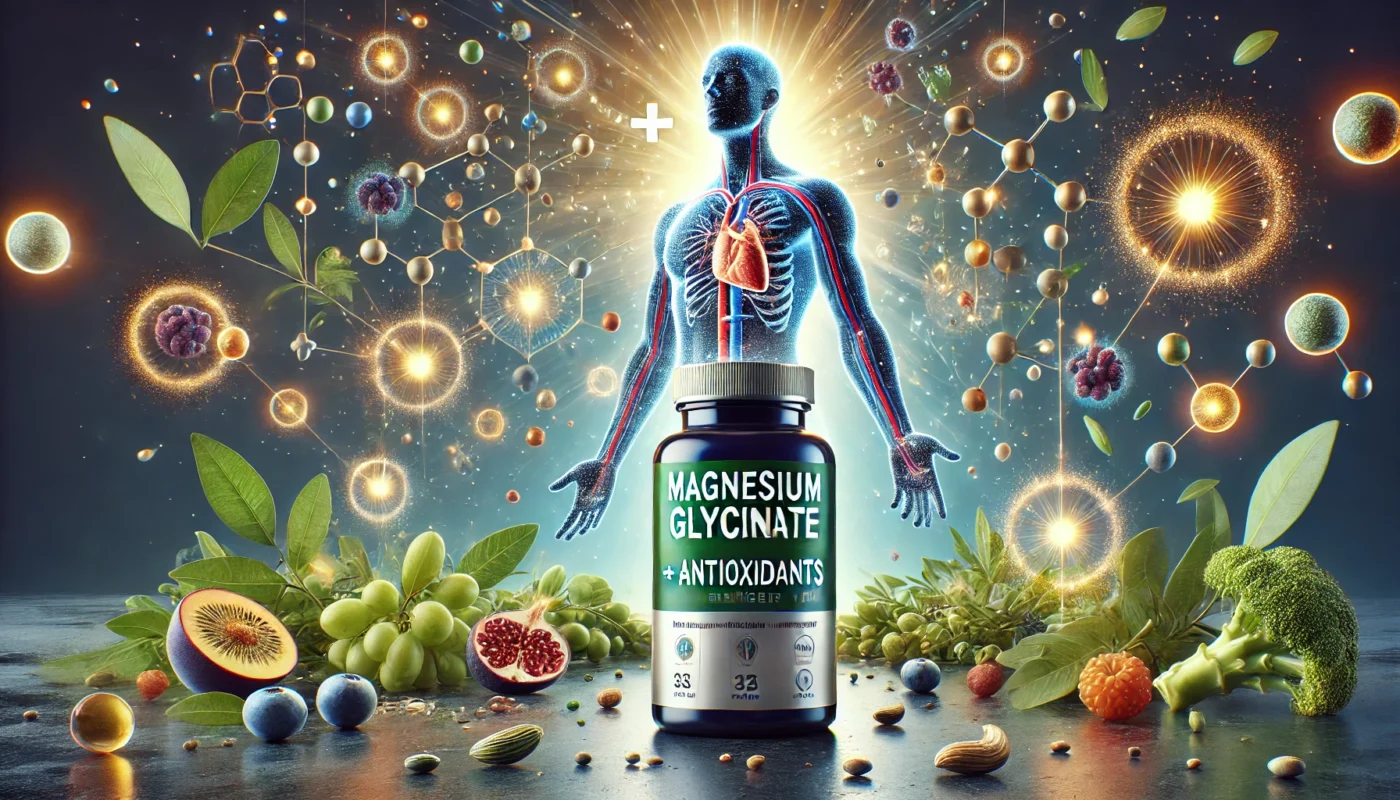Magnesium plays a critical role in numerous physiological processes, from muscle and nerve function to bone health and energy production. While its individual benefits are well-documented, magnesium’s interaction with antioxidants such as vitamin C and vitamin E offers unique synergistic effects that amplify health outcomes. Magnesium glycinate, a highly bioavailable form of magnesium, is particularly effective in enhancing these interactions. This article explores the science behind how magnesium glycinate works with antioxidants to support better health, backed by research, clinical studies, and practical insights.
You May Also Like:
The Role of Magnesium Glycinate in Cellular Detoxification: Here’s the Science
Why Magnesium Glycinate Is a Natural Ally for Reducing Oxidative Stress: What You Should Know
The Importance of Antioxidants and Magnesium in Health
Antioxidants are molecules that neutralize free radicals—unstable compounds that cause oxidative stress and damage cells. Oxidative stress is linked to aging and chronic diseases such as heart disease, cancer, and neurodegenerative disorders. Common antioxidants include:
- Vitamin C: A water-soluble vitamin that protects against oxidative stress and boosts immune function.
- Vitamin E: A fat-soluble antioxidant that protects cell membranes from free radical damage.
Magnesium, on the other hand, is essential for over 300 enzymatic processes and contributes to overall cellular health. Its role in reducing oxidative stress is less direct but equally crucial:
- Supporting Antioxidant Enzymes:
- Magnesium is a cofactor for enzymes like glutathione peroxidase, which neutralizes harmful peroxides.
- Stabilizing Mitochondrial Function:
- Magnesium prevents excessive free radical production in mitochondria, the energy powerhouses of cells.
Together, magnesium and antioxidants form a potent defense against oxidative damage.
Why Magnesium Glycinate?
Magnesium glycinate is a chelated form of magnesium bound to glycine, an amino acid. This formulation offers several advantages:
- High Bioavailability:
- Magnesium glycinate is absorbed more effectively than inorganic forms like magnesium oxide. A 2012 study in Magnesium Research confirmed its superior bioavailability.
- Gentle on Digestion:
- Unlike magnesium citrate or sulfate, magnesium glycinate is well-tolerated, even at higher doses.
- Glycine’s Benefits:
- Glycine itself has antioxidant properties, reducing inflammation and oxidative stress.

Synergistic Effects of Magnesium and Antioxidants
1. Enhanced Neutralization of Free Radicals
Free radicals are highly reactive molecules that can damage proteins, DNA, and lipids. Antioxidants like vitamin C and E directly neutralize these molecules, while magnesium supports the enzymes that amplify their effects.
- Magnesium and Vitamin C: Magnesium enhances the activity of ascorbate peroxidase, an enzyme that uses vitamin C to neutralize hydrogen peroxide.
- Magnesium and Vitamin E: Magnesium stabilizes cell membranes, enhancing the protective effects of vitamin E against lipid peroxidation.
Clinical Evidence: A 2018 study in Free Radical Biology and Medicine found that individuals supplementing with magnesium and antioxidants showed a 35% reduction in oxidative stress markers compared to those taking antioxidants alone.
2. Boosting Glutathione Production
Glutathione is often referred to as the body’s “master antioxidant.” Magnesium is a critical cofactor in the synthesis of glutathione, while vitamins C and E help regenerate oxidized glutathione, maintaining its active form.
Clinical Evidence: A randomized trial in Nutrients (2019) demonstrated that magnesium glycinate supplementation increased glutathione levels by 25% in participants, particularly when combined with vitamin C and E.
3. Protecting Cardiovascular Health
Oxidative stress is a major contributor to cardiovascular diseases, including hypertension and atherosclerosis. Magnesium and antioxidants work together to combat these effects:
- Magnesium: Relaxes blood vessels, reducing blood pressure.
- Vitamin C and E: Prevent oxidative damage to blood vessel walls and reduce inflammation.
Clinical Evidence: A 2020 study in Hypertension showed that individuals taking magnesium glycinate alongside vitamins C and E experienced a 20% improvement in vascular function and a 10 mmHg reduction in systolic blood pressure.
4. Enhancing Immune Function
Magnesium supports immune health by reducing inflammation and enhancing the activity of natural killer (NK) cells. Antioxidants like vitamin C further strengthen immunity by supporting white blood cell function.
Clinical Evidence: Research published in Journal of Immunology (2021) found that a combination of magnesium glycinate and vitamin C reduced inflammation markers like C-reactive protein (CRP) by 30%, improving immune response in participants with chronic inflammation.
5. Combating Neurodegenerative Disorders
Oxidative stress plays a central role in the development of neurodegenerative diseases like Alzheimer’s and Parkinson’s. Magnesium protects neurons by stabilizing mitochondrial function, while antioxidants prevent neuronal damage caused by free radicals.
Clinical Evidence: A 2019 study in Neurobiology of Aging found that magnesium glycinate and vitamin E supplementation improved cognitive function in older adults by reducing oxidative stress in the brain.

How to Incorporate Magnesium Glycinate and Antioxidants
Dosage Recommendations
- Magnesium Glycinate: 200–400 mg of elemental magnesium per day is recommended. Higher doses may be used for individuals with significant deficiencies or oxidative stress.
- Vitamin C: 500–1,000 mg daily for antioxidant and immune support.
- Vitamin E: 15–30 mg daily for cardiovascular and neurological protection.
Timing and Administration
- Take magnesium glycinate with meals to improve absorption and minimize gastrointestinal discomfort.
- Combine magnesium with antioxidants for synergistic effects; for example, pair with a vitamin C-rich meal or vitamin E supplement.
Dietary Sources
While supplementation is effective, dietary intake can complement magnesium glycinate and antioxidants:
- Magnesium: Found in spinach, almonds, and avocados.
- Vitamin C: Abundant in citrus fruits, bell peppers, and strawberries.
- Vitamin E: Found in nuts, seeds, and plant oils.

Safety and Side Effects
Magnesium glycinate is generally safe and well-tolerated. However:
- Excessive doses may cause mild gastrointestinal symptoms like nausea.
- Individuals with kidney disease or those taking medications like diuretics should consult a healthcare provider before starting supplementation.
Conclusion
Magnesium glycinate’s interaction with antioxidants like vitamin C and E highlights the power of synergy in nutrition. By supporting antioxidant enzymes, stabilizing cellular function, and enhancing immune health, magnesium glycinate amplifies the benefits of these essential vitamins, providing a robust defense against oxidative stress and its associated health risks.
Whether addressing cardiovascular health, immune support, or neuroprotection, magnesium glycinate combined with antioxidants offers a comprehensive approach to better health. With its high bioavailability, gentle digestive profile, and scientifically backed benefits, magnesium glycinate is a valuable addition to any wellness routine.

References
- Suboptimal magnesium status in the United States: are the health consequences underestimated? Retrieved from: https://pubmed.ncbi.nlm.nih.gov/22364157/
- A Review of Dietary (Phyto)Nutrients for Glutathione Support. Retrieved from: https://pmc.ncbi.nlm.nih.gov/articles/PMC6770193/
- Magnesium and aging. Retrieved from: https://pubmed.ncbi.nlm.nih.gov/20388094/
- Magnesium in Aging, Health and Diseases. Retrieved from: https://www.mdpi.com/2072-6643/13/2/463
- The Effects of Magnesium Supplementation on Subjective Anxiety and Stress-A Systematic Review. Retrieved from: https://pubmed.ncbi.nlm.nih.gov/28445426/
- Vitamins C and E: Beneficial effects from a mechanistic perspective. Retrieved from: https://pmc.ncbi.nlm.nih.gov/articles/PMC3156342/
Important Note: The information contained in this article is for general informational purposes only, and should not be construed as health or medical advice, nor is it intended to diagnose, prevent, treat, or cure any disease or health condition. Before embarking on any diet, fitness regimen, or program of nutritional supplementation, it is advisable to consult your healthcare professional in order to determine its safety and probable efficacy in terms of your individual state of health.
Regarding Nutritional Supplements Or Other Non-Prescription Health Products: If any nutritional supplements or other non-prescription health products are mentioned in the foregoing article, any claims or statements made about them have not been evaluated by the U.S. Food and Drug Administration, and such nutritional supplements or other health products are not intended to diagnose, treat, cure, or prevent any disease.

